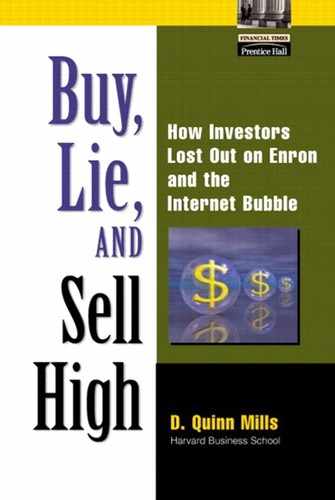Mass Hysteria
The strongest evidence for mass hysteria, not fraud, comes from the participation of professionals—executives and investors—people who should have known better but took baths in the bubble. If these smart people got burned, the argument goes, then it must have been because they truly believed in the financial potential, and it wasn't a fraud.
For example, George Shaheen, Chief Executive Officer at Andersen Consulting (now Accenture), the world's largest consulting firm, left to run Internet start-up Webvan for a compensation package heavy in stock options. Shaheen left Webvan early in 2001, just before it went bankrupt and closed. Shaheen had been a well-compensated executive at Andersen, but had been lured away by the promise of shares of Webvan—his shares and options at one time having been said to have been worth more than $100 million. But he left Webvan with nothing like this kind of money; he had sacrificed both substantial income and status by leaving Andersen. It does not seem to have been a successful move for him, but he was and is a sophisticated businessperson. Other similar examples exist. So it is argued that since smart people made mistakes, the bubble must have been based on more than transparent fraud.
Further, some sophisticated business people suffered serious losses via investments during the bubble. Newsweek even compiled a list of 10 large-scale investments by experienced investors in telecom companies which turned out badly.[67]
Because the bubble was a public hysteria, the argument goes, neither investment bankers, venture capitalists, nor entrepreneurs were guilty of anything more than bad judgment. Everyone knew the rules in the game, it is said, and they all knew what they were dealing with. The argument continues by asserting that venture firms were also adding value to the firms in which they'd invested by giving advice and contacts to the companies, and giving them the financial means to get started. The conclusion of the argument is that even though they made some mistakes, the venture firms did want the companies to succeed and did believe that they could do so.
Then the argument goes on to find a villain. It was the banks that misled the public investors and changed the game, it is said, and they also added no value.
But the banks have their defenders as well. It is said that the bank analysts' projections of likely dot-com earnings were based on a premise that the Internet was going to become all-powerful—that all transactions would take place on the Internet, and that the entire economy would change. They were wrong, but they were all wrong—an honest error, the argument continues.
The justification continues to its end as follows: Even if they had concerns and reservations about the new economy notion and about particular firms, it was impossible for banks, and venture firms and entrepreneurs, not to jump on this bandwagon, because there was the fear that they would miss out on a tremendous opportunity. Everyone was in it for the money on the mistaken belief that there were great riches ahead. It was a frenzy, not fraud.
But are these assertions of innocence persuasive? Perhaps not entirely.
